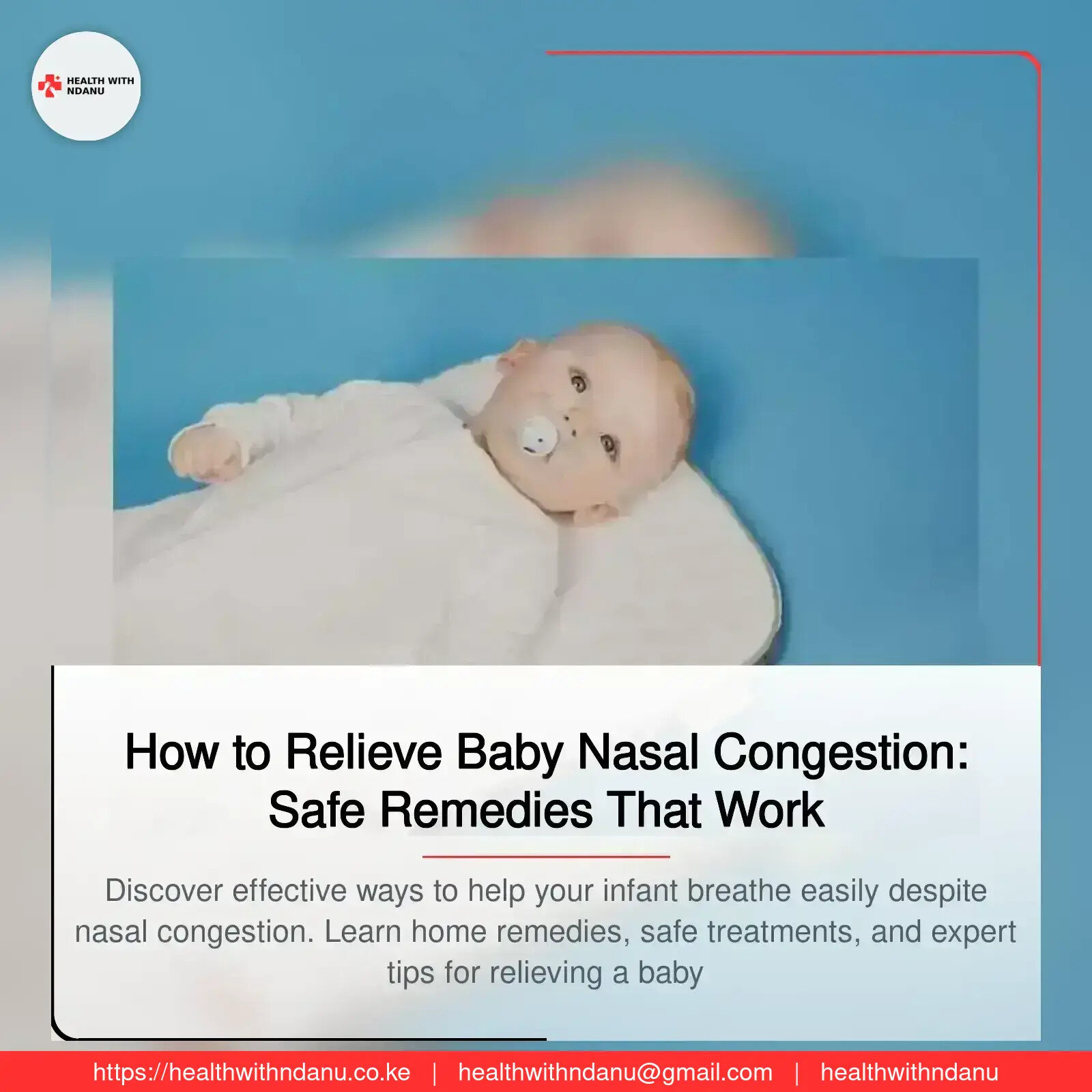How to Relieve Baby Nasal Congestion: Safe Remedies That Work
- by Diana Ndanu
- 28 March, 2025
- 0 Comments
- 7 Mins



If you’re a parent, you’ve probably been there — your little one is stuffy, sniffling, and clearly uncomfortable. Infant nasal congestion is common, but that doesn’t make it any easier to watch. When your baby struggles to breathe, feed, or sleep because of a blocked nose, it’s natural to worry. The good news? You can help your baby breathe easier right from home with safe, effective remedies.
In this article, we’ll explore everything you need to know about relieving nasal congestion in infants, from gentle home remedies and safe treatments to expert tips. Whether your baby has a cold, allergies, or dry air is to blame, we’ve got you covered.
Why Do Babies Get Nasal Congestion So Easily?
Babies, especially newborns, have tiny nasal passages. Even a small amount of mucus can block airflow and make breathing difficult. Unlike older children or adults, infants can’t blow their noses. They rely on you to help them clear their airways.
Common causes of nasal congestion in babies include:
- Common cold – The most frequent culprit
- Dry air – Especially during colder months
- Allergies or irritants – Like smoke, dust, or pet dander
- Teething – May cause mild congestion
- Infections – Such as sinusitis or the flu
- No matter the cause, keeping your baby’s nasal passages clear helps them feed, sleep, and breathe more comfortably.
Signs Your Baby Has Nasal Congestion
Before jumping into remedies, it’s important to recognize the signs of a congested nose in your baby:
- Noisy or labored breathing
- Snorting or sniffling sounds
- Difficulty feeding (especially while breastfeeding or bottle-feeding)
- Trouble sleeping or frequent waking
- Irritability or fussiness
- Mild cough from post-nasal drip
If these symptoms are accompanied by high fever, green mucus, or your baby seems unusually lethargic, consult a doctor.
Effective Home Remedies to Relieve Infant Nasal Congestion
Home remedies can be incredibly effective, especially for mild to moderate nasal congestion. Let’s explore gentle, natural ways to help your baby breathe easier.
1. Use a Saline Nasal Spray or Drops
- Saline (saltwater) nasal drops are one of the safest and most effective treatments for baby congestion.
- How it helps: Moistens the nasal passages and loosens thick mucus.
How to use:
- Lay your baby down and tilt their head slightly.
- Use a dropper to put 2–3 drops in each nostril.
- Wait 30 seconds to 1 minute.
- Use a nasal aspirator or bulb syringe to gently suction out the loosened mucus.
2. Use a Nasal Aspirator (Bulb Syringe or Suction Tool)
After using saline drops, a nasal aspirator can help physically remove the mucus.
Tips:
- Squeeze the bulb before inserting it into the nostril.
- Gently release it to create suction.
- Clean it thoroughly after each use.
- Electric nasal aspirators are also popular for parents looking for an easier, hands-free option.
3. Run a Humidifier
- Dry air, especially in air-conditioned or heated rooms, can worsen nasal congestion. A cool-mist humidifier helps add moisture to the air.
- Place it near your baby’s crib, but out of reach. Make sure to clean it regularly to prevent mold and bacteria.
4. Use Steam to Loosen Mucus
Steam is a natural decongestant. It can help loosen mucus and clear up nasal passages.
What to do:
- Sit in the bathroom with your baby and run a hot shower (do not put baby in the water).
- Stay for about 10–15 minutes while the room steams up.
- Hold and soothe your baby as the steam works its magic.
5. Elevate Baby’s Head (During Supervised Nap Time)
- Gravity can help mucus drain and reduce congestion. Slightly elevate your baby's head during supervised naps by placing a rolled towel under the mattress or using an inclined baby sleeper.
- Never place pillows in the crib and always follow safe sleep guidelines.
Other Helpful Tips for Relieving Baby’s Congestion
6. Hydrate, Hydrate, Hydrate
Fluids thin mucus and keep your baby’s nasal passages moist. Offer breast milk or formula more frequently. For older babies, you can offer small sips of warm water or clear fluids.
7. Keep Baby’s Environment Allergen-Free
Dust, pet dander, and strong scents can irritate your baby’s nasal passages. Keep your home clean and fragrance-free.
Tips:
- Avoid using strong cleaning products or air fresheners.
- Vacuum often.
- Keep pets out of the nursery.
8. Breastfeed as Much as Possible
Breast milk not only provides nutrition but also strengthens your baby's immune system. It’s easier for breastfed babies to stay hydrated and recover faster.
Safe Treatments and When to Use Them
While home remedies work for most babies, some cases might need over-the-counter (OTC) treatments or doctor-recommended solutions.
9. When to Consider OTC Treatments
- Saline nasal sprays are always safe and effective.
- Never give cough or cold medicine to babies under 2 years old unless directed by a pediatrician.
- Baby-safe chest rubs (like those made with eucalyptus or lavender for infants) can be used externally on the chest and back. Never apply near the nose.
10. Seek Medical Advice If You Notice:
- Fever over 38°C (100.4°F)
- Refusal to feed or signs of dehydration (dry mouth, fewer wet diapers)
- Wheezing, trouble breathing, or blue-tinged lips
- Mucus that turns green or yellow for more than a few days
Your pediatrician might recommend specific medications or tests depending on the cause of congestion.
Preventing Nasal Congestion in Babies
Prevention is always better than cure. Here’s how to reduce the chances of your baby getting a stuffy nose in the first place:
- Limit exposure to sick people
- Wash hands frequently – especially before feeding or touching your baby’s face
- Avoid secondhand smoke
- Breastfeed exclusively (if possible) for the first six months
- Use a humidifier during dry seasons
Frequently Asked Questions About Baby Nasal Congestion
Q: How long does nasal congestion last in babies?
A: Most cases resolve within 5–7 days, especially if it’s due to a cold. If symptoms persist longer, consult your doctor.
Q: Can teething cause nasal congestion?
A: Mild congestion can occur during teething due to increased saliva and slight inflammation. But if the congestion is severe or persistent, another cause may be involved.
Q: Is it safe to let my baby sleep with a stuffy nose?
A: Yes, but monitor your baby closely. Keep the air moist, elevate the head slightly, and use safe nasal clearing methods before bedtime.
Q: Should I worry if my newborn has a blocked nose?
A: Newborns often have “newborn congestion” in the first few weeks. This usually clears up on its own. However, if your baby struggles to breathe or feed, see a doctor.
Final Thoughts: Helping Your Baby Breathe Easy
Nasal congestion in babies is no fun for anyone — especially your little one. But with a few simple, safe home remedies and expert-backed tips, you can ease their discomfort and help them sleep, feed, and smile again.
Remember, it’s always okay to call your pediatrician if something doesn’t feel right. You know your baby best, and a little peace of mind goes a long way.
Key Takeaways:
- Use saline drops and a nasal aspirator for instant relief
- Keep the air moist with a humidifier or steam
- Avoid irritants like dust, smoke, and strong scents
- Ensure your baby is well-hydrated
- Watch for warning signs that require medical help
Got Your Own Experience? Share with us
Kategoria Maarufu
Blogu Zinazotembelewa Zaidi
Daily Newsletter
Get all the top stories from Blogs to keep track.



